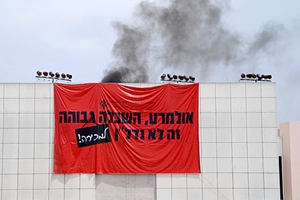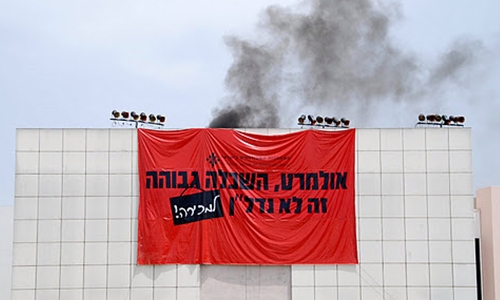
Tel Aviv University has called on lecturers to turn in students who carried out protest activities on campus last week. Students and lecturers accused the University of resorting to “secret police” methods and oppressing legal social protest on campus.
According to “Haaretz”, in a letter sent to lecturers in the history, philosophy and literature departments, the university’s security department attached a YouTube clip showing students urging their friends on campus to join the social protest they were planning at the university

student’s demonstration at Tel-Aviv University (Photo: N.B.)
“I will be grateful for your handing over the students’ details as soon as possible, including full name, ID number and telephone number,” the TAU security head wrote to the lecturers.
“It will be helpful if beyond identifying the students, you would attach to each [one’s name] the identification marks from the clip so that we can identify them in action … since this group has already carried out and is planning illegal protest activity on campus,” he wrote.
The group calls itself “The Sourasky Operation – a campus action group,” after the Sourasky Library near which it had gathered. Last week, when the university’s management heard the group was planning social activity in the building, it evacuated the library ahead of closing time, locked it and posted security guards at the entrance.
The several dozen students moved their social activity to the Recanati Building, where they discussed renewing the social protest with an emphasis on students’ issues such as housing, tuition, cost of living and workers’ rights. Prof. Eli Friedlander, head of the philosophy department, responded to the university’s letter, saying: “I strongly protest the security department head’s disgraceful demand in the email. There is no place for a secret police on campus.” The YouTube clip sent to the lecturers shows students facing the camera and calling their friends to act for social justice.
“We are students who want to make ends meet, who want to study in dignity, to have a place to live. We want to submit papers, not only serve coffee,” they said, among other things.
“In the current sociopolitical environment, it is not surprising that the university is acting like a secret police. It’s a natural reflection of what is happening ‘outside’ and our initiative is a bid to fight these social and political injustices,” says Nimrod Flashenberg, a third-year history and philosophy student who appears on the clip. “The university is oppressing sociopolitical activity on campus,” he says.
The university also sent several student activists letters scolding them for their activity last week. “If any public activity takes place in the future without proper authorization, harsh disciplinary steps will be taken against the organizers and participants,” the security department head wrote.
“A student found organizing or participating in illegal public activity will have difficulty receiving a permit to hold public activity on campus in the future,” he added. One student said the security department told her it was following the group’s activity on its closed Facebook page. This was corroborated by two of the group members who did not attend the meetings, but received warning letters all the same.
The You Tube clip (2.01 minutes, Hebrew):
http://www.youtube.com/watch?feature=player_embedded&v=vPJ81zt9THc


